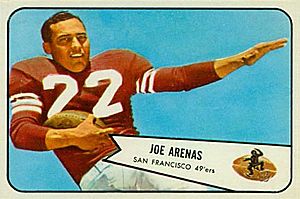Joe Arenas facts for kids

Arenas on a 1954 Bowman football card
|
|||||||
| No. 71 | |||||||
|---|---|---|---|---|---|---|---|
| Position: | Halfback, defensive back | ||||||
| Personal information | |||||||
| Born: | December 12, 1925 Cedar Rapids, Iowa |
||||||
| Died: | June 30, 2020 (aged 94) Texas |
||||||
| Career information | |||||||
| High school: | Lincoln (NE) | ||||||
| College: | Nebraska–Omaha | ||||||
| NFL Draft: | 1951 / Round: 8 / Pick: 89 | ||||||
| Career history | |||||||
|
|||||||
| Career highlights and awards | |||||||
|
|||||||
| Career NFL statistics | |||||||
|
|||||||
| Player stats at PFR | |||||||
Guadalupe Joseph Arenas (December 12, 1925 – June 30, 2020) was an American football player. People knew him as "Lupe Joe" Arenas or "Little Joe" Arenas. He played as a halfback and defensive back for the San Francisco 49ers. He played from 1951 to 1957.
Arenas was famous for returning kickoffs and punts. When he retired, his 4,572 total return yards were the most in NFL history. His average of 27.3 yards per kick return is still one of the best ever. Joe Arenas was also one of the first successful Mexican-American players in American football.
Contents
Military Service and Toughness
Joe Arenas was born in Cedar Rapids, Iowa, in 1925. He served in the United States military for four years. This was during and after World War II. He was part of the invasion of Iwo Jima. He got hurt by shrapnel and received a Purple Heart medal. Arenas believed his time in the military made him mentally and physically strong. This strength helped him succeed in football.
College Football Journey
Joe Arenas did not play football in high school. He started playing after he left the military. He once said that his mom asked him what he would do with his life. This made him decide to go to school. He first planned to play basketball at the University of Nebraska.
Later, he moved to the University of Nebraska-Omaha. It was called Omaha University back then. He wanted to play football there. He played college football at Omaha from 1947 to 1950. In 1948, he was named the most valuable player on his team. In 1949, he led Omaha in both rushing and passing yards. He also played basketball at Omaha. In 1950, he was the team's second-highest scorer.
Playing for the San Francisco 49ers
The San Francisco 49ers picked Joe Arenas in the 8th round of the 1951 NFL Draft. He played for the 49ers for seven seasons. These were from 1951 to 1957.
On December 16, 1951, he made a huge play. He returned a punt 51 yards against the Detroit Lions. This play helped knock the Lions out of the NFL division championship. In 1951, he led the NFL with 814 kick and punt return yards. He also led the NFL in yards per touch in 1951 and 1955.
In December 1956, Arenas had two long returns. These helped the 49ers beat the Baltimore Colts 30-17. He returned a kickoff 96 yards. Then, he returned a punt 68 yards for the winning touchdown. The 49ers coach, Frank Albert, called him "the greatest clutch artist." He said Arenas was "the difference between the two clubs today."
Joe Arenas was a very popular player during his seven years with the 49ers. People liked his exciting style of play. He was known for his spirit and effort. He made many long runs that thrilled the fans.
Arenas retired from football in September 1958. He wanted to focus on his job as a salesman for a coffee company. He had been working there during the off-season.
In his seven years in the NFL, Arenas had 987 rushing yards. He also had 774 punt return yards and 3,798 kick return yards. He scored 17 touchdowns. His career average of 27.3 yards per kick return is still one of the best in NFL history. His 4,572 career kick and punt return yards was an NFL record when he retired.
Life After Football
After retiring from playing, Joe Arenas continued to be involved with football. For 23 years, from 1963 to 1986, he was an assistant football coach. He coached for the Houston Cougars football team. He worked under College Football Hall of Fame coach Bill Yeoman. Arenas helped train many talented receivers who later played in the NFL. These included players like Riley Odoms and Carl Hilton.
He also volunteered as a coach at Rice University from 1987 to 1988. From 1991 until at least 2002, Arenas was a volunteer coach for the Ball High School football team in Galveston. He said it was fun and kept him busy. He enjoyed helping young men.
Family and Recognition
Joe Arenas was married to Maxine Brynston Arenas. They had two daughters, Vicki Ritter and Tracey Arenas. Maxine passed away in August 2008.
In 2000, Joe Arenas was honored. He was inducted into the Laredo Latin American International Sports Hall of Fame. He was also featured in a book called "Athletes Remembered." This book was about Mexicano/Latino professional football players.
 | Frances Mary Albrier |
 | Whitney Young |
 | Muhammad Ali |

